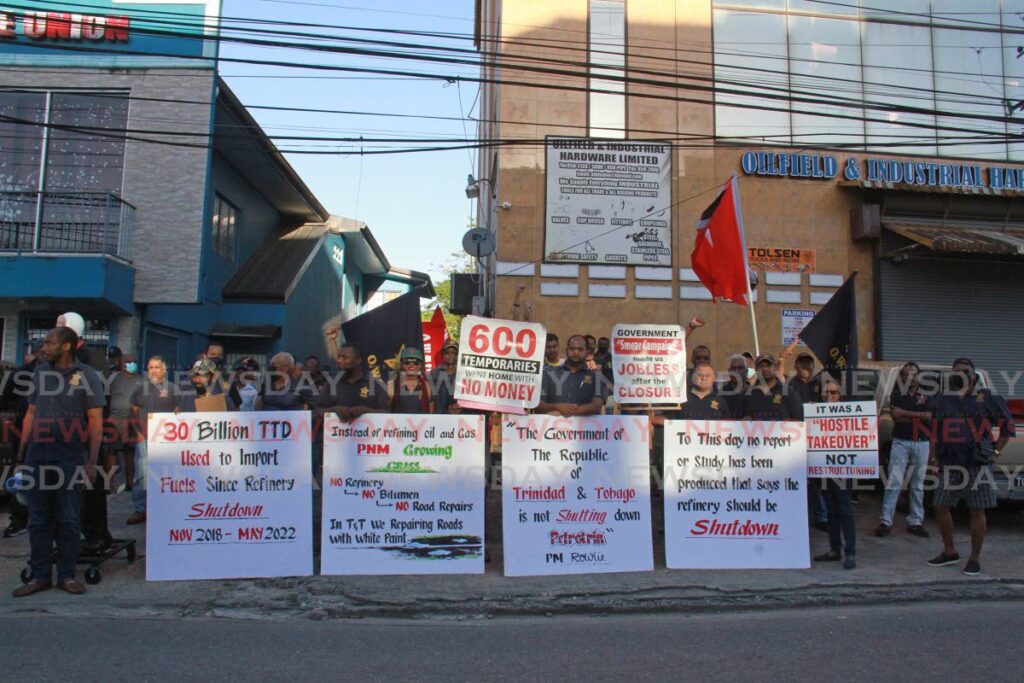Roget: Trinidad and Tobago worse off because of Petrotrin closure

EX-Petrotrin workers are demanding that the Pointe-a-Pierre refinery be reopened and put in their hands.
They made the demand during a march to commemorate the fourth anniversary of the closure of operations at the refinery at the Pointe-a-Pierre roundabout on November 30.
In November 2018, Petrotrin - TT's state-owned oil and gas company - completed a major restructuring drive aimed at streamlining operations and cutting cost.
The move resulted in major job losses.
After the refinery's closure, Petrotrin was broken up into separate entities: Heritage Petroleum - responsible for exploration, development production and marketing of crude oil - and Paria Fuel Trading Company responsible for trading and marketing of imported fuel products. Trinidad Petroleum was established as a holding company which owns Heritage, Paria and Guaracara Refining Company, another holding company, which was tasked with the management and sale of the refinery. In February 2021, the Government said it will not be accepting proposals by Patriotic Energies and Technologies, a subsidiary of the Oilfield Workers Trade Union, which represented Petrotrin workers.
In May 2022, the Prime Minister told the Parliament a preferred bidder had been identified for the refinery.
Dr Rowley said proposals from four bidders were received and evaluated and discussions were being held with the preferred bidder.
At last Wednesday's march, OWTU president general said the only people who could start up and run the refinery properly and safely were its ex-workers.
“Keith Christopher Rowley don’t know anything about refinery," he said. Roget said Petrotrin was a hub around which many economic activities revolved.
“Once you removed that hub, everything fell apart,” he said.
“Great is the suffering under the People’s National Movement (PNM),” he said. Roget said the company contributed to corporate tax, supplemental petroleum tax from the producing fields while a quarter of the workers' salaries went to PAYE.
He also blamed the refinery's closure for the poor state of the roads, the economy and the ever-increasing cost of gas.
“Every time your car drops into a pothole, blame Keith Christopher Rowley.
“What they would not say is that one of the main reasons they cannot fix all the potholes is because they do not have bitumen. When he shut down Petrotrin, he did not know that the refinery produced that particular component that, when mixed with asphalt God gave us in La Brea, you get barber green to fix the road. “
Roget said scare foreign exchange, which Petrotrin earned, was now being used to import bitumen and fuel.
“We are now getting the worst quality of fuel. Everybody could relate to the scent coming from the diesel, how quickly the various fuel evaporates, not yielding and there is nobody to check the quality of the fuel.”
He said when the refinery was in operation there were proper checks to ensure the quality of products sold to regional and extra-regional markets.
“Over the last four years, Government increased the gas price and they will increase it again, once we remain silent. When gas prices go up, your ability to live a decent life is also compromised.
“If we had the refinery running, we would have been able to produce fuels at a lower cost and afford the national community less strain in their pockets.”
He also accused the Prime Minister of lying to the country.
"(He) told the country if we did not close down Petrotrin we would not have proper roads, hospital beds will not be available, no proper schools, no money to spend.”
However, Roget said these problems still existed.
“This country is worse off," he said. He also defended the OWTU, insisting it negotiated the best plans and benefits for workers.
A minute's silence was observed for the four divers who lost their lives at Paria in February and the 600 ex-workers and retirees who have died over the past four years.

Comments
"Roget: Trinidad and Tobago worse off because of Petrotrin closure"